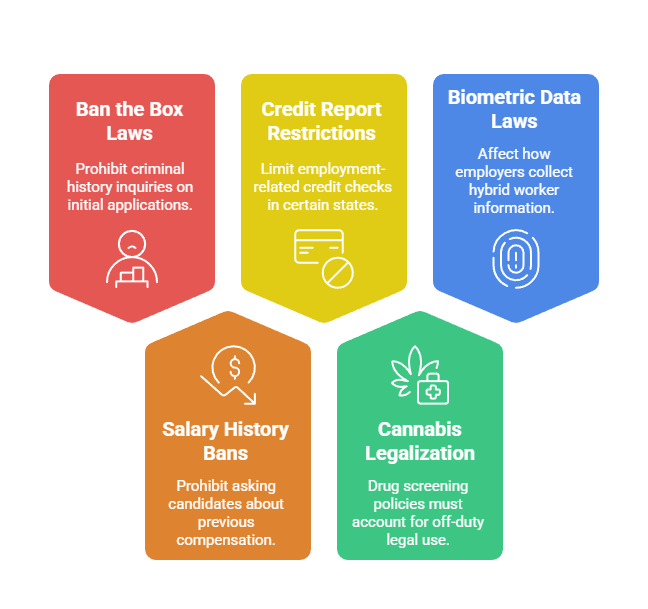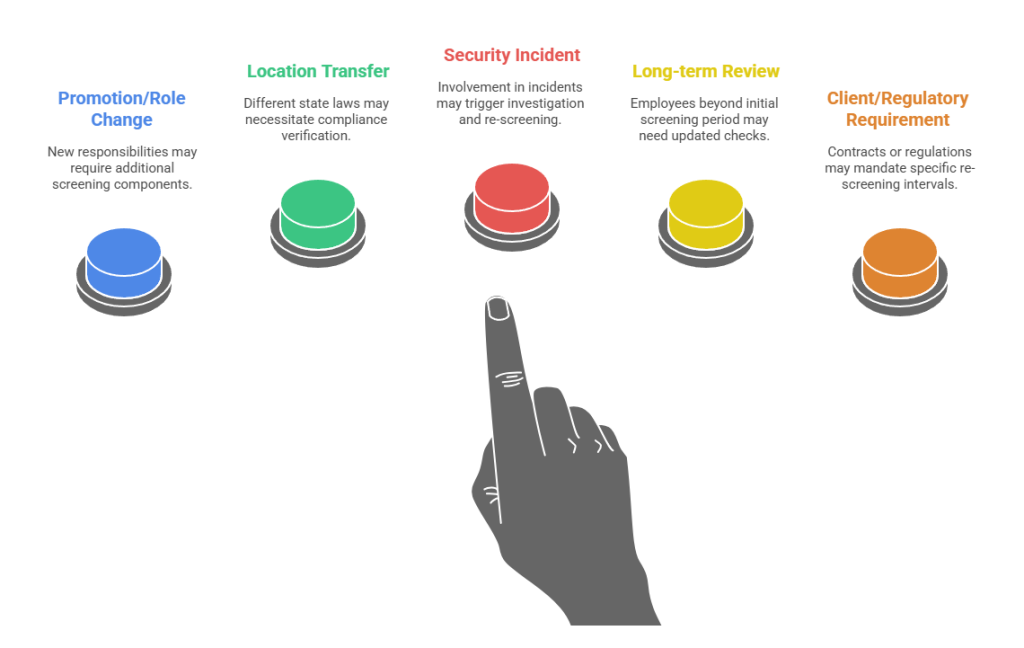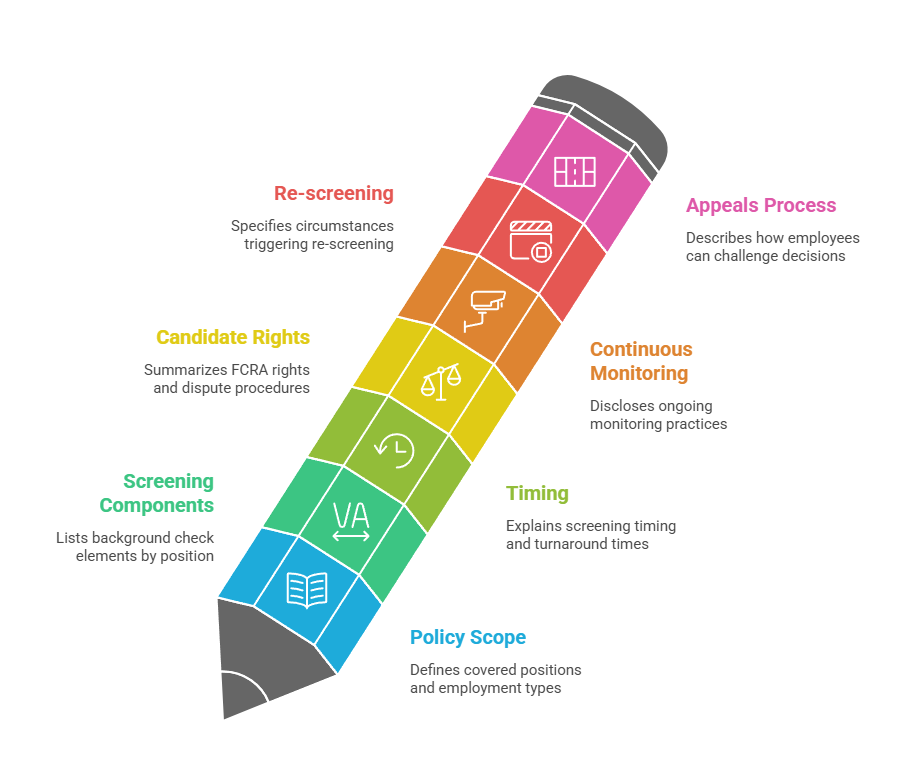As hybrid work models become standard across American businesses in 2025, employers must navigate the complexities of applying consistent background screening policies to employees who split time between remote and office locations. This comprehensive guide addresses the unique compliance challenges, FCRA requirements, and best practices for conducting background checks on hybrid workers while maintaining fairness, reducing liability, and protecting both organizational interests and employee rights.
Key Takeaways
- Hybrid workforce screening policies must apply the same FCRA-compliant standards to both remote and on-site employees to avoid discrimination claims and legal exposure.
- Employers need written consent before conducting background checks on hybrid workers, regardless of where employees physically work, with clear disclosure of the scope and purpose.
- Continuous monitoring programs for hybrid staff require separate authorization and must comply with state-specific laws that vary significantly across jurisdictions.
- Position-specific screening protocols should focus on job responsibilities rather than work location, ensuring relevant checks align with actual duties performed.
- Pre-adverse and adverse action procedures under FCRA apply identically to hybrid workers, requiring proper notice periods and dispute resolution opportunities.
- Multi-state compliance considerations become critical when hybrid employees work across state lines, as background check laws differ substantially by location.
- Hybrid workforce policies should address re-screening triggers, including role changes, location transfers, and time-based review intervals to maintain ongoing security.
- Documentation and recordkeeping requirements under FCRA extend for specific retention periods, demanding organized systems that track hybrid employee screening across all work locations.
Understanding Background Checks in Hybrid Work Environments
The shift to hybrid work models has fundamentally changed how employers approach workforce screening. According to recent workplace surveys, approximately 74% of U.S. companies now operate with some form of hybrid arrangement, where employees divide time between home offices and physical worksites. This flexibility creates unique challenges for HR departments tasked with maintaining consistent, compliant background check processes.
Background checks for hybrid workers encompass the same core components as traditional employment screeningâÂÂcriminal history, employment verification, education confirmation, and credential validation. However, they require additional considerations around jurisdiction, monitoring frequency, and policy consistency. The physical location where an employee works doesn't diminish an employer's responsibility to conduct thorough due diligence, nor does it change the fundamental legal requirements governing pre-employment and ongoing screening.
The key distinction in hybrid workforce screening isn't about different standards for different locations. Instead, it's about applying uniform, job-relevant criteria consistently while accommodating the logistical realities of a distributed workforce. This approach ensures fairness, reduces legal risk, and maintains the integrity of the background check process across all employment arrangements.
Hybrid work has made one truth impossible to ignore: if our screening practices arenâÂÂt consistent, our culture wonâÂÂt be either. IâÂÂve seen how easy it is for organizations to unintentionally hold remote or mostly-remote employees to different standards than those who are in the office more oftenâÂÂand how quickly that erodes trust, creates perceptions of bias, and exposes the business to risk. A screening process is not simply a screening process for our hybrid workforce. It is our statement to every job applicant and worker: âÂÂNo matter your position with our firm, we treat you the same.â This means we write policies that treat people the same regardless of their role location and take problematic results with care and respect to ensure we not only remain compliant with the law but also ensure our culture promotes flexibility and fairness.
FCRA Compliance Requirements for Hybrid Employee Screening
Disclosure and Authorization Obligations
The Fair Credit Reporting Act establishes mandatory procedures that apply to all employment-related background checks, including those for hybrid workers. Before obtaining a background report, employers must provide applicants or employees with a clear, standalone disclosure document that explains the screening process. This disclosure cannot be embedded within employment applications, policy handbooks, or other materials.
After receiving the disclosure, candidates must provide written authorization permitting the background check. For hybrid positions, this authorization should explicitly state that screening applies regardless of work location and may include checks relevant to both remote and on-site responsibilities. Digital signatures are acceptable under FCRA, which facilitates the screening process for remote candidates who may never visit a physical office location.
Pre-Adverse and Adverse Action Procedures
When background check results reveal information that may lead to an unfavorable employment decision, FCRA requires a specific notification process. The pre-adverse action stage begins when an employer intends to take action based on background report findings. At this point, the employer must provide the candidate with a copy of the consumer report, a written explanation of their rights under FCRA, and reasonable time to review and dispute any inaccuracies.
| Pre-Adverse Action Steps | Adverse Action Steps |
| Provide copy of background report to candidate | Wait appropriate period after pre-adverse action (typically 5 business days minimum) |
| Include Summary of Rights under FCRA | Send adverse action notice with specific reasons for decision |
| Allow reasonable time for dispute (5+ days recommended) | Provide contact information for screening company |
| Consider candidate's response and updated information | Include statement of candidate's right to dispute report accuracy |
If the employer proceeds with the negative employment action after the pre-adverse period, they must send a formal adverse action notice. This notice must identify the consumer reporting agency that provided the report and state that the agency didn't make the employment decision. These procedures apply identically whether the hybrid worker would have worked primarily remotely, primarily on-site, or in a balanced arrangement.
Recordkeeping and Documentation Standards
FCRA compliance for hybrid workforce screening demands meticulous documentation practices. Employers must retain records of disclosure forms, authorization documents, background reports, pre-adverse action communications, adverse action notices, and any candidate disputes. While FCRA itself doesn't mandate exact retention timeframes, related employment laws generally require maintaining these records for at least one year after making employment decisions, with many compliance experts recommending three to five years.
For hybrid workers specifically, documentation should clearly indicate which screening components apply to which aspects of their role. When hybrid employees work across multiple states, records should reflect compliance with the most stringent applicable state law. Centralized digital recordkeeping systems help ensure that screening documentation remains accessible regardless of where hybrid employees are located.
Designing Effective Hybrid Workforce Background Check Policies

Position-Based Screening Protocols
Effective background check policies for hybrid teams focus on job responsibilities rather than work location. A financial analyst accessing sensitive data requires the same screening rigor whether working from corporate headquarters or a home office. The risk profile stems from job duties, system access, and information handlingâÂÂnot from the physical environment where work occurs.
Employers should conduct job analyses that identify specific risk factors and corresponding screening needs. This position-based approach ensures screening intensity matches actual risk while avoiding arbitrary distinctions based on work location. Such distinctions could trigger discrimination concerns and legal challenges.
| Job Risk Level | Screening Components | Hybrid Considerations |
| High-risk positions | Criminal history, credit reports (where permitted), employment verification, education verification, license validation | Identical screening regardless of work location; may include technology security checks |
| Medium-risk positions | Criminal history, employment verification, education verification, license validation | Standard protocols apply; consider on-site presence for site-specific requirements |
| Lower-risk positions | Criminal history, employment verification | Maintain consistency but tailor depth to actual responsibilities |
Documentation of these position-based screening decisions protects employers from claims of inconsistent treatment. When hybrid workers question why certain checks apply to their roles, written policies that articulate job-relevant rationales provide clear justification.
Multi-State Compliance Considerations
Hybrid work arrangements frequently involve employees working across state lines, creating complex compliance obligations. Background check laws vary significantly by state, with some jurisdictions imposing restrictions on criminal history inquiries, "ban the box" requirements, salary history bans, and credit report limitations. When a hybrid employee works in multiple states or works remotely from a state different from the employer's headquarters, determining which state's laws apply becomes critical.
The general rule states that employers must comply with the laws where the employee works, not necessarily where the company is headquartered. When hybrid workers split time between multiple states, the safest approach applies the most restrictive relevant state law to avoid compliance gaps. Key compliance areas include:

- Ban the Box laws: Over 37 states and 150+ cities prohibit criminal history inquiries on initial applications, affecting when employers can conduct criminal background checks.
- Salary history bans: Multiple jurisdictions prohibit asking candidates about previous compensation, impacting employment verification processes.
- Credit report restrictions: States including California, Colorado, Connecticut, Hawaii, Illinois, Maryland, Nevada, Oregon, Vermont, and Washington limit employment-related credit checks.
- Cannabis legalization: Drug screening policies must account for off-duty legal use protections in states like New York, New Jersey, and California.
- Biometric data laws: Illinois' BIPA and similar laws affect how employers collect hybrid worker information for identity verification.
Compliance management for multi-state hybrid workforces often requires legal counsel familiar with employment law across relevant jurisdictions. Employers should review screening policies annually as state laws evolve rapidly.
Remote Verification Procedures and Identity Confirmation
Verifying hybrid worker identities and credentials remotely requires additional safeguards compared to in-person processes. When candidates never visit a physical office location, employers must implement remote verification procedures that meet Form I-9 requirements, confirm identity authenticity, and prevent fraud. Since 2020, temporary flexibility around remote I-9 verification has ended for most employers, requiring physical document examination within three business days of employment start dates.
For hybrid workers who do visit offices periodically, employers should schedule I-9 verification during on-site periods. When immediate in-person verification isn't possible, employers may use authorized representatives in the employee's location to examine identity documents. Beyond I-9 requirements, credential verification for hybrid workersâÂÂincluding education degrees, professional licenses, and certificationsâÂÂshould follow the same rigorous standards as traditional hires.
Continuous Monitoring and Re-Screening for Hybrid Workforces
Implementing Ongoing Monitoring Programs
Continuous monitoring programs track criminal records, sex offender registries, and other databases for new information about current employees. For hybrid workforces, continuous monitoring offers advantages over periodic re-screening by identifying issues as they arise rather than waiting for scheduled reviews. This real-time approach particularly benefits organizations with hybrid workers who have access to sensitive systems, vulnerable populations, or high-security facilities.
Before implementing continuous monitoring for hybrid staff, employers must obtain separate, specific authorization beyond initial hire background check consent. FCRA requires clear disclosure explaining that ongoing monitoring will occur throughout employment, what databases will be monitored, and how alerts will be handled. State laws impose additional restrictions on continuous monitoring programs, with some jurisdictions requiring annual re-authorization or limiting monitoring to specific employee categories.
Re-Screening Triggers and Frequency
In addition to or instead of continuous monitoring, many employers conduct periodic re-screening of hybrid workers at established intervals or when specific events occur. Time-based re-screeningâÂÂsuch as every three or five yearsâÂÂensures regular updates on employee backgrounds. Event-based re-screening typically includes promotions to higher-responsibility roles, transfers to positions with different risk profiles, or assignment to projects involving sensitive information or vulnerable populations.
Common re-screening triggers include:

- Promotion or role change: New responsibilities may require additional screening components not conducted initially.
- Location transfer: Moving to states with different background check laws may necessitate compliance verification.
- Security incident: Involvement in data breaches, theft, or policy violations may trigger investigation and re-screening.
- Long-term employee review: Employees beyond initial screening period (3-5 years) may undergo updated checks.
- Client or regulatory requirement: Contracts or regulations may mandate specific re-screening intervals for particular projects.
Each re-screening event requires fresh FCRA disclosures and authorizations, following the same procedures as initial employment screening. Re-screening policies should apply consistently across all hybrid workers in similar positions, avoiding selective application that could suggest discriminatory intent.
Addressing Findings That Emerge During Employment
When continuous monitoring alerts or periodic re-screening reveal new information about hybrid employees, employers face complex decisions balancing workforce protection with employee rights. Criminal convictions that occur during employment don't automatically justify termination. Employers must evaluate relevance to job duties, consider rehabilitation evidence, assess time elapsed since the incident, and comply with applicable state laws before taking adverse action.
FCRA's adverse action requirements apply to employment decisions based on information obtained during continuous monitoring or re-screening. Employers must provide pre-adverse action notices with copies of reports, allow time for employees to respond, and send formal adverse action notices if they proceed with negative employment decisions. Several states have enacted "fair chance" laws that restrict how employers can use criminal history discovered during employment, requiring individualized assessments.
Special Considerations for Remote and On-Site Hybrid Components
Technology Access and Cybersecurity Screening
Hybrid workers who access company systems remotely present unique security considerations that may warrant specialized screening components. While traditional background checks focus on criminal history and employment verification, cybersecurity-focused screening may include assessment of digital literacy, prior security incidents, and understanding of data protection protocols. However, employers must ensure any additional screening related to remote system access remains job-relevant and complies with privacy laws.
Some organizations conduct social media reviews or online presence assessments for hybrid positions involving remote technology access or public-facing responsibilities. These reviews raise significant legal concerns, as federal and state laws increasingly restrict employment decisions based on lawful off-duty conduct or social media activity. At least 30 states prohibit adverse employment actions based on lawful off-duty activities, and the National Labor Relations Act protects certain collective discussions about working conditions.
Physical Security and Facility Access
Hybrid workers who spend any time in physical office locations require the same facility access screening as full-time on-site employees. Background checks for physical security typically include criminal history relevant to workplace safety, violence prevention, and theft deterrence. Positions with access to secure areas, valuable property, or sensitive physical documents may warrant more comprehensive criminal screening regardless of whether employees work on-site daily or occasionally.
Employers should resist the temptation to apply lighter screening standards to hybrid workers who visit offices infrequently. A hybrid employee working remotely 80% of the time but accessing headquarters weekly still requires appropriate vetting for physical access privileges. Badge systems, access controls, and security protocols should align with background check results for hybrid workers, with documentation clearly indicating what access levels correspond to screening results.
Best Practices for Hybrid Hiring and Onboarding
Integrating Screening Into Hybrid Hiring Workflows
Seamless integration of background checks into hybrid hiring processes requires coordination between HR, hiring managers, IT, and compliance teams. The screening process should begin after conditional offers but before providing system access or sharing sensitive information. Technology platforms that manage hybrid hiring workflows should incorporate background check triggers, status tracking, and compliance reminders.
Clear communication with hybrid candidates about screening timelines, requirements, and expectations prevents confusion and improves candidate experience. Providing estimated timelines for background check completion and explaining what components apply to their specific role demonstrates professionalism. When delays occurâÂÂsuch as difficulty verifying international credentialsâÂÂproactive candidate communication maintains goodwill and manages expectations.
Developing Transparent Hybrid Workforce Policies
Written background check policies specifically addressing hybrid work arrangements demonstrate organizational commitment to consistent, fair screening practices. These policies should clearly state that screening standards apply uniformly regardless of work location. They should also explain what job categories require which screening components and describe the process from disclosure through final employment decisions.
Key policy elements include:

- Policy scope: Define which positions and employment types the hybrid screening policy covers.
- Screening components: List specific background check elements by position category with explanations of job relevance.
- Timing: Explain when screening occurs and expected turnaround times.
- Candidate rights: Summarize FCRA rights, dispute procedures, and clarification processes.
- Continuous monitoring: Disclose ongoing monitoring practices, authorization requirements, and alert response procedures.
- Re-screening: Specify circumstances triggering re-screening during employment.
- Appeals process: Describe how hybrid employees can challenge adverse action decisions.
Policies should undergo legal review to ensure compliance with federal FCRA requirements and relevant state laws. Annual policy reviews keep pace with changing legal landscapes and evolving business needs.
Training Managers on Compliant Screening Decisions
Hiring managers and supervisors involved in hybrid workforce screening decisions need training on legal compliance, bias prevention, and fair evaluation of background check results. Many employment discrimination claims arise not from screening policies themselves but from inconsistent application or subjective interpretations of results. Training should cover FCRA requirements, state-specific restrictions, how to evaluate criminal history in relation to job duties, and recognizing unconscious bias.
For hybrid workforces specifically, training should address the importance of location-neutral screening decisions. Managers shouldn't recommend stricter screening for remote workers based on surveillance difficulty or assume on-site workers need lighter screening due to physical visibility. Instead, training should reinforce that screening intensity depends on role responsibilities, system access, and risk factors regardless of where employees perform their work.
Balancing Security Needs With Employee Privacy Rights
Privacy considerations become particularly important when screening hybrid workers who perform significant work from personal spaces. While background checks primarily occur during hiring, employers must distinguish between pre-employment screening and ongoing surveillance of work activities. State laws increasingly regulate employee monitoring, particularly for remote workers, with Connecticut, Delaware, and New York requiring specific notice to employees about electronic monitoring.
Best practices for hybrid workforce monitoring emphasize transparency, limitation to business-necessary surveillance, and respect for personal privacy boundaries. Employers should provide clear notice about what monitoring occurs and focus surveillance on business systems rather than personal devices. When screening extends to continuous background monitoring rather than activity surveillance, separate FCRA-compliant authorization ensures legal compliance.
Employee communication about screening should acknowledge privacy concerns while explaining legitimate business interests. Hybrid workers need assurance that screening focuses on job-relevant factors rather than intrusive surveillance of personal lives. When background check findings lead to employment discussions, respectful, private conversations preserve employee dignity regardless of whether these conversations occur via video conference or in person.
Conclusion
Background checks for hybrid workers require the same commitment to FCRA compliance, fairness, and job-relevance that governs all employment screening. However, they must also accommodate the unique logistical and legal complexities of distributed workforces. Employers who establish clear, consistent policies focused on position requirements rather than work location create screening programs that protect organizational interests without undermining workplace flexibility. As hybrid models continue dominating the American workplace landscape in 2025 and beyond, maintaining compliant, transparent screening practices builds trust with hybrid teams while managing risk effectively. In the end, hybrid workforce screening is not simply a question of regulationsâÂÂbut it is a question of connection. Every background check is one of respect and accountability. It is the job of the strongest companies to have a culture in which flexibility and integrity can coexist. A background check is not a roadblock; it is a bridge between people, policies, and purpose.
Frequently Asked Questions
Do background check requirements differ for remote versus on-site hybrid employees?
No, FCRA and most employment laws don't distinguish between remote and on-site workers when it comes to background check requirements. Screening standards should focus on job responsibilities and risk factors rather than work location. Employers who apply different screening standards based solely on work location risk discrimination claims and compliance violations. The key principle is job-relevance: what responsibilities does the position entail, and what screening components reasonably relate to those duties?
How often should employers re-screen hybrid workers during their employment?
Re-screening frequency depends on industry regulations, position risk levels, and specific job requirements. High-risk positions may require annual continuous monitoring or periodic re-screening every 3-5 years, while lower-risk roles may only need event-triggered screening such as promotions or role changes. Employers should establish clear policies that apply consistently across similar positions regardless of hybrid status and obtain fresh authorization before each re-screening event. Documentation of business justifications for re-screening decisions demonstrates compliance and fair treatment.
Can employers conduct different types of background checks based on how much time hybrid employees spend in the office?
Employers should base screening components on job duties and access levels rather than percentage of time spent in physical offices. However, if certain screening components specifically relate to physical security concernsâÂÂsuch as checks for employees with access to secure facilitiesâÂÂemployers might reasonably differentiate based on actual facility access. Any such distinctions must be clearly job-relevant, consistently applied, and documented to withstand potential legal scrutiny. Arbitrary screening differences based solely on office presence frequency create legal vulnerability without serving legitimate business purposes.
What state laws apply when hybrid employees work across multiple state lines?
Employers generally must comply with employment laws in every state where hybrid employees perform work, not just the company's headquarters location. When an employee works in multiple states, the safest approach applies the most restrictive relevant state law to ensure comprehensive compliance. Some employers adopt nationwide policies based on the most protective state laws across their entire workforce to simplify compliance. Multi-state compliance requires monitoring evolving state laws and documenting which state laws apply to each hybrid employee.
Are continuous monitoring programs legal for hybrid workers, and do they require separate consent?
Yes, continuous monitoring programs are legal for hybrid workers when properly implemented with appropriate authorization. FCRA requires employers to obtain separate, specific consent for continuous monitoring beyond initial hire background check authorization. The disclosure must clearly explain that ongoing monitoring will occur throughout employment, what information sources will be monitored, and how results will be used. Several states impose additional restrictions or requirements for continuous monitoring programs.
How should employers handle background check findings that emerge during hybrid workers' employment?
Employers must follow FCRA's adverse action procedures when taking negative employment action based on information discovered during employment. This includes providing pre-adverse action notices with copies of reports and allowing time for employees to respond. Beyond FCRA compliance, employers should conduct individualized assessments evaluating the finding's nature, its relationship to job responsibilities, time elapsed, evidence of rehabilitation, and applicable state "fair chance" laws. Documentation of the assessment process and consistent application of decision criteria protects employers from wrongful termination or discrimination claims.
What identity verification challenges exist for fully remote hybrid workers who never visit offices?
Form I-9 compliance presents the primary identity verification challenge for hybrid workers who don't visit physical offices. Current regulations generally require employers to physically examine original identity and work authorization documents within three business days of employment start dates. For fully remote hybrid workers, employers may use authorized representatives in the employee's location to examine documents and complete Form I-9 Section 2. Temporary remote I-9 flexibility that existed during the COVID-19 pandemic has ended for most employers.
Do "ban the box" laws affect when employers can conduct criminal background checks on hybrid workers?
Yes, "ban the box" laws affect the timing of criminal history inquiries for hybrid workers in jurisdictions where these laws apply. Over 37 states and 150+ cities have enacted variations of ban the box legislation, typically prohibiting criminal history questions on initial employment applications and requiring employers to delay criminal background checks until later in the hiring process. When hybrid workers are located in or work in ban the box jurisdictions, employers must comply with those timing restrictions even if company headquarters are in states without such laws.
Additional Resources
- FCRA Compliance Guide for Employers
https://www.ftc.gov/business-guidance/resources/using-consumer-reports-what-employers-need-know - Form I-9 and Remote Verification Procedures
https://www.uscis.gov/i-9-central - State Background Check Laws and Ban the Box Legislation
https://www.nolo.com/legal-encyclopedia/state-laws-use-arrests-convictions-employment.html - EEOC Guidance on Arrest and Conviction Records
https://www.eeoc.gov/laws/guidance/enforcement-guidance-consideration-arrest-and-conviction-records-employment-decisions - Electronic Communications Privacy Act Overview
https://www.dol.gov/general/topics/privacy

GCheck Editorial Team
Meet the GCheck Editorial Team, your trusted source for insightful and up-to-date information in the world of employment background checks. Committed to delivering the latest trends, best practices, and industry insights, our team is dedicated to keeping you informed.
With a passion for ensuring accuracy, compliance, and efficiency in background screening, we are your go-to experts in the field. Stay tuned for our comprehensive articles, guides, and analysis, designed to empower businesses and individuals with the knowledge they need to make informed decisions.
At GCheck, we're here to guide you through the complexities of background checks, every step of the way.







